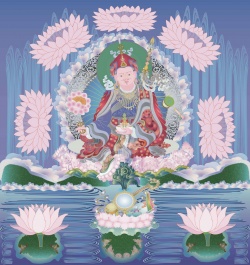Adhimukta
According to the Pali Text Society dictionary:
Adhimutta (adj.) [pp. of adhimuccati, cp. BSk. adhimukta. Av. ŚI.8, 112; Divy 49, 302 etc.] intent upon (--°or with loc. or acc.), applying oneself to, keen on, inclined to, given to Vin I.183; A V.34, 38; Dh 226; Sn 1071, 1149 (°citta); Nd2 33; J I.370 (dān°) Pug 26; PvA 134 (dān°).
Adhimutti (f.) (adhi + mutti] resolve, intention, disposition D I.174; A V.36; Ps I.124; Miln 161, 169; Vbh 340, 341; DA I.44, 103; Sdhp 378.
According to Edgerton's dictionary (see pp. 14-15 for many usage examples)
adhimukta (Pali adhimutta), ppp. of adhimucyate, (1) zealous about, actively interested in or devoted to (a) non-religious objects … ; (b) religious objects. ...
adhimukti, f. (= Pali adhimutti; to adhimucyate), (1) strong inclination, attachment; earnest, zealous application; Tib. mos pa (Jaschke, to be pleased, la with; to wish, to have a mind; to take pleasure in, to rejoice at; as substantive pleasure, satisfaction, esteem; also to respect, to esteem, to respect with devotion, to revere, to adore)… Usually it is not so specifically stated, tho the context is apt to suggest that it is zealous cultivation (study or propagation) of sacred texts or religious instruction that is meant...
In Sanskrit, it is the prefix adhī (turn the mind toward, seek, understand, teach) + mukti (liberation). So, to turn the mind toward and understand liberation. In that sense, it is a decision, a commitment, a confidence or faith in the 4NT as a path of liberation.
This term presents a difficulty… "Adhimukti is the consideration of the object from the point of view of its qualities; according to others, complaisance; according to the Ascetics (the Yogacarins), the contemplation of the object in conformity with the decision taken." (This last point is explained ad. ii. 72 adhimuktimanaskara)…
Paramartha translates: "Adhimukti, tha is neng you ching yin-k'o..." We can translate: "that which makes a sign of approbation with respect to the object." The expression yin (=mudra) k'o (possible) is mentioned by Rosenburg in many word lists. A. Whaley, who has consulted the Japanese glosses, translates: "the sign of approval given to a disciple who has understood what has been taught him." We would thus have k'o = k'o-I = "this is allowable" (A. Debasse). Adhimukti is the approbation of the object, the dharma by reason of which one grasps the object under consideration; it marks the first stage of the act of attention. See the note of Shwe Zan Aung, Compendium, p. 17 and 241 on adhimokkha: "… the settled state of a mind…; it is deciding to attend to this, not that irrespective of more complicated procedure as to what 'this' or 'that' appears to be."
Samghabhadra (TD 29, p. 384b9): Approbation (yin k'o) with repect to an object is called adhimukti. According to other masters, adhi signifies "superiority, sovereignty;" mukti signifies vimoksa. Adhimukti is a dharma by virtue of which the mind exercises its sovereignty over an object without any obstacle; like adhisila. Adhimukti is a separate object, for the Sutra says: "The mind, by reason of adhimukti, approves of (yin k'o) the object." When the mental states arise, all approve (yin) the object; as a consequence adhimukti is a mahabhumika. Nevertheless the Sthavira says: "It is not proven that adhimukti is a separate thing, for we see that its characteristic is not distinguished from that of knowledge (jnana): the characteristic of adhimukti is that the mind is determined (niscita) with respect to its object. But this is not different from the characteristic of knowledge (jnana) Consequently adhimukti is not a separate thing." This is not correct, for approbation (yin k'o) brings about determination.
Some say: "Adhimukti is determination (avadharana, niscaya)." This is to give the cause of determination (namely adhimukti) the name of its effect. If this is the case, then adhimukti and determination would not be simultaneous. No: for these two mutually condition one another: by reason of discernment (pratisamkhya) there arise approbation, and by reason of approbation there arises determination (niscaya). There is not contradiction: thus there is no obstacle to their being simultaneous. If all thought include these two, then all categories off mind will be approbation and determination. This objection is worthless, for it happens that their activity is damaged when they are dominated by dharmas: even if there is approbation (yin) and determination, they are small and recognized only with difficulty.
Adhimukti refers to a very specific dharma in abhidhamma/abhidharma psychological analysis and is not adequately captured in a term like "faith" or "trust" or any other other renditions of the term into English, particularly when translated to English via Chinese. For reasons I won't get into, I think some East Asians caught on to this problem of conflating several distinct terms into 信 and even 信解 and took steps in response. Another matter.
Adhimukti is usually translated into Chinese as 信解. From that point, Chinese commentators discuss the word in terms of the component parts of the Chinese translation. Thus you see explanations like it means "faith and understanding," which in turn is explained as meaning "attaining understanding through faith" or "give rise to faith to generate understanding."
Such interpretations are important for understandings for how texts were read in East Asia, but are not necessarily what the term meant in India. Its a very good idea to try to learn what terms and texts meant in India, but its also a good idea not to overly disregard or devalue how the Chinese read these texts on that basis, particularly if you're practicing in a Sino-Japanese tradition.
Source
www.dharmawheel.net [[Category:]]


